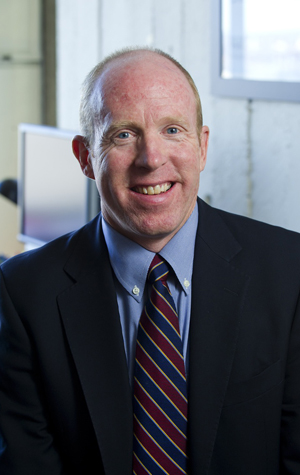Metcalf Award Winner David Walker
A prof so good, he can even teach you how to do your taxes

A student compared one of this year’s Metcalf Award winners to Chuck Norris—and it was a pedagogical compliment.
“Long live Walker, Taxes Ranger!” proclaimed the grateful pupil of David Walker, a School of Law professor and Maurice Poch Faculty Research Scholar. Walker is an expert on the federal tax code, and the student’s written exclamation was praise for his mentor’s ability to make that incomprehensible topic, well, comprehensible.
The Metcalf Cup and Prize and the Metcalf Awards for Excellence in Teaching are the University’s highest teaching honors. “Classes such as Federal Income Taxation and Corporations, often dreaded by students, become enlightening and career-changing experiences,” Walker’s Metcalf citation reads. “His innovative course in Deals gives students valuable experience to compete in a difficult job market.” (The course probes the economics behind commercial transactions.) “In other courses, he trains them to think like contract lawyers and challenges his students to analyze actual transactions presented by alumni practitioners.”
Perhaps the ultimate compliment came from a student who wrote, “I’m just happy I know how to do my own taxes now!”
“I’m truly honored” by the award, says Walker, “and thankful that I am part of an organization that places such a high priority on exemplary teaching.”
Walker is something of a Renaissance man. His undergraduate degree from Vanderbilt is in chemical engineering, and he worked in the oil industry as a crude oil trader, chemical engineer, and assistant to the president of British Petroleum’s U.S. arm before deciding on a career change. He chose the law out of both passion and pragmatism.
“I decided while I was at BP that I wanted to teach at the college or professional school level,” he says, both to learn new things himself and to instruct young minds. “I had always been interested in legal matters while in industry, and the great thing about pursuing a JD was that if the teaching idea didn’t work out, I could always earn a decent living as a lawyer.”
His practicality extends to his teaching style. While he expects diligence, promptness, and intimidation-free learning in class, Walker says, “I am not sure that I have an approach to teaching,” adding that it varies by course. In teaching corporate and tax law, which change often (unlike, say, property law), he focuses on explaining the underlying economic transactions, while making himself available out of class for struggling students. “After their first year, law students tend not to attend office hours. I don’t find that to be the case for my classes, which suggests to me that this approach is working,” he wrote in his statement of teaching philosophy for the Metcalf selection committee.
His course Deals: The Economic Structure of Transactions and Contracting is rare among law schools, he wrote, and requires a different approach. In the class, student teams are assigned real-life legal transactions submitted by alumni and must critique the contractual provisions involved in each deal. The alum who worked on the deal then meets with the class for a Q&A session. With lots of ground to cover—both economic concepts and how those concepts are expressed in contracts—“my approach here is to push quite hard,” Walker says, with a time-consuming, “hands-on, one-on-one or one-on-team learning experience.”
Walker earned a legal degree from Harvard in 1998 and worked as an associate in the tax department at the Boston-headquartered global law firm Ropes & Gray before joining the LAW faculty in 2002.
The Metcalf awards date to 1973 and are funded by a gift from the late BU professor and Board of Trustees chairman emeritus Arthur G. B. Metcalf (SED’35, Hon.’74). The Metcalf Cup and Prize winner receives $10,000, the Metcalf Award winners $5,000 each. A University committee selects winners based on nominees’ statements of teaching philosophy, supporting letters from colleagues and students, and classroom observations of the teachers. The Metcalf honors are presented at Commencement.
Rich Barlow can be reached at barlowr@bu.edu.

Comments & Discussion
Boston University moderates comments to facilitate an informed, substantive, civil conversation. Abusive, profane, self-promotional, misleading, incoherent or off-topic comments will be rejected. Moderators are staffed during regular business hours (EST) and can only accept comments written in English. Statistics or facts must include a citation or a link to the citation.